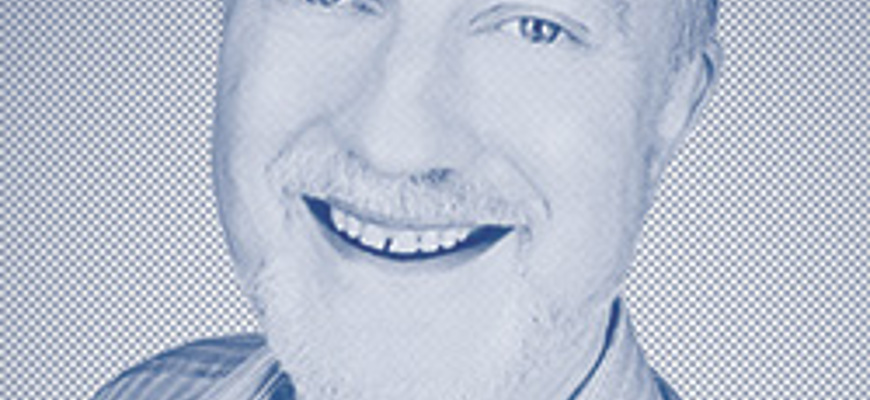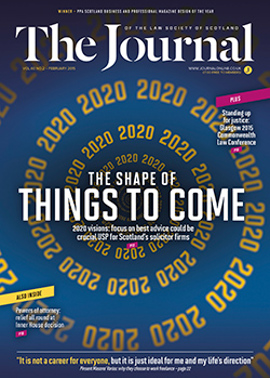The dispute resolvers

What was the career path to your current position, and why did you decide to leave the bar and start up your own business?
I did not really thrive on being a solicitor. The bar was an exciting, challenging and collegial environment. I spent several happy years there and greatly enjoyed court work. In the mid-90s, I took on the role of the Faculty’s first director of training and education. For me, building the Faculty’s advocacy training programme from scratch was a real privilege and I learned that working with other professionals in training and high-quality skills development was something that fascinated me. At that time, I trained at Harvard in negotiation and then as a mediator. These two experiences changed my life. I could see another way of doing things, perhaps more in tune with my own philosophy. I wanted to make a difference, to do something different. So, I left the bar in the hope of establishing commercial mediation in Scotland and developing high-quality training in dispute resolution. The rest, as they say, is history. It has been the most fulfilling time of my professional career.
Describe a typical day in your job.
There is no typical day! There is such variety in what I do. I may be mediating one day, which usually involves reaching the venue by about 8.45 and leaving any time from 4.30 to, well, much later (although I rarely mediate past 9pm now). On our website, I describe a “typical” mediation day in The Mediator’s Log (www.core-solutions.com/news-events/the-mediator-s-log/). If I am running training, the day will generally start at 9am and go through until about 5pm (though I undertake a lot of training with UK Sport and others where times can vary to meet the needs of those involved), and I may have to travel or attend an in-house event in some country location. Otherwise, I tend to tackle emails for the first hour or two, go into the office and have a strategy meeting with the team and, very often, meet a number of contacts for coffee – it is remarkable how much is done in cafés these days!
What motivates you to get up on a Monday morning?
Life. We only have this opportunity. It is not a rehearsal. We can each make a contribution. It may not be much but, as I read on a poster once, the difference between something which is ordinary and something which is extraordinary is that little “extra”. I am a great believer in working at the margins and, as I said earlier, trying to make a difference. I am really privileged in that, very often, I meet people facing difficult situations and can offer to help, even a little. That applies, of course, to most lawyers too.
The feedback from your session was very good. What do you see as the key learning points for in-house lawyers?
That they have a key role to play in advising and guiding their business colleagues in preventing, managing and resolving potential and actual disputes, and providing up-to-date problem-solving skills for many tricky contractual, workplace, supply-chain, regulatory or other matters. In-house lawyers can, if they choose, see themselves as peripheral, only brought in when there is a contract to draft or a dispute has arisen. Or they can be much more active as trusted professionals who are seen as central to the business (or public sector body) itself, offering excellent negotiation techniques for deal-making, strategies for dispute prevention, and helping their organisation to avoid binary right/wrong, win/lose approaches and achieve real added value from multi-faceted legal input.
Why are you such an evangelist about dispute resolution?
Because I really believe that how we try to resolve disputes defines us as business people, professionals, lawyers and members of society. An awful lot of time, energy, resource and money are spent using adversarial and polarising methods to deal with difficult situations. We default too easily to a world of black and white when things are usually much more complex, nuanced and grey. Most weeks, I see significant disputes resolved in one day after festering for months or years, often costing more than the amount in issue and causing sometimes irreconcilable breakdown in business and personal relationships. We can’t afford this. At a time when we all need to be more efficient and effective, prolonged antagonistic disputes are time-consuming, costly, detract from corporate value, demotivate those involved and carry major risks for the business. For me, helping people avoid this and achieve much better performance, in business and as individuals, is what really motivates me. Overall, I think we can use mediation as one way to help build a better and more sustainable society.
Do you deal with many in-house lawyers, and how do they compare with private practice lawyers?
I deal with in-house lawyers very frequently in mediations. It would be unfair to universalise. I think that many lawyers (often trained in mediation, as many Scottish in-house lawyers have been) really understand what we call interest-based negotiation and are excellent at helping clients and business colleagues make very effective use of mediation. I see some really good work these days by all sorts of lawyers. In-house lawyers, however, are well attuned to the needs of the business. Recently, I saw one impressive in-house lawyer effectively running a mediation in her room, taking precedence over the senior decision-makers. They made the final decisions, but she clearly had their confidence, and her intimate understanding of the business from a commercial viewpoint and her ability to contextualise that within the legal and factual aspects of the case gave her real authority. On the other hand, I have seen external lawyers add a necessary bit of perspective and independence in a difficult situation. Often, both viewpoints will be helpful.
What do you see as the key strengths of in-house lawyers?
What a great opportunity to be there at the heart of corporate and public sector activity, using the skills and techniques that only a legal training can give you. An intimate understanding of the way a business or local authority works, for example, should give in-house lawyers a real edge in many situations.
How can in-house lawyers best avoid disputes arising within their own organisations in the first place?
Encourage a culture of early identification of possible problems, requiring “nip it in the bud” processes; train staff to recognise and deal with situations in real time rather than let them drag on (most disputes start as a relatively small matter, which then escalates as people avoid it or fail to communicate); and build in mediation as a positive early intervention approach, in-house or involving an outside third party if necessary. Insert dispute resolution clauses in contracts, providing for early resolution through co-operative methods, including mediation, before defaulting to litigation or arbitration (or grievance procedures). Above all, build really effective relationships at board level, with customers, within teams and departments, and with suppliers and other contractors.
What are the benefits of mediation training for in-house legal teams?
I think that the training provides such a wide education in problem-solving techniques and approaches to difficult issues, as well as how to act as a third-party facilitator, that it can really help in-house lawyers reposition themselves in the business. This feedback from an in-house lawyer on Core’s flagship mediation and negotiation course sums it up:
“Every day provides some opportunity to use what I’ve learnt... One of the things I’ve had to do a lot of is interviewing both whistleblowers and suspected miscreants – all within the company, but across a very wide cultural spectrum – as part of various investigations, and learning both to ask questions in the right way and to really listen to the answers continues to be an enormous help. Engaging in those conversations in a collaborative way makes a huge difference to how people feel about the situation and to how much we find out about what actually went on, as well as to everyone’s engagement in sorting out the issues that need to be dealt with. I have yet to figure out whether and how one might mediate a compliance matter, but can see all kinds of possibilities for introducing mediation as a way of overcoming some of the issues that lead to compliance failures in the first place.”
What do you think makes a good in-house lawyer and a good mediator?
Are they both the same?! The common ground would be: excellent listening to the concerns of others, willingness to ask hard questions but in a fair way, commercial realism, genuine interest in the people involved and the subject matter, a willingness to stand apart and challenge orthodoxies of thinking, calmness under pressure, really good communication skills and an ability to build rapport with all sorts of different people.
What do you predict for the future of the in-house legal profession?
I hope it can only get stronger. As costs are closely managed to ensure that value is being maintained and added, in-house lawyers are well placed to lead in modern business management. But it may take a willingness to move away from traditional roles and models and embark on even more creative approaches in the future.
Out of the office, how do you relax?
My role means that I am usually “out of the office” and I don’t really see a divide between “work” and “other life”. It’s all part of the journey. But I do find that I read a lot more than I used to, and use the Kindle function on my iPad in a way I would not have imagined two years ago. I am a real music enthusiast (prog rock being my thing) and listen to music most of the time if I can, and go to as many concerts as I did 30 years ago (often the same bands!). I also enjoy golf and the gym, and find that I am attending more sports events than before, especially football, although I won’t mention my own team’s fortunes. I also am fortunate to have three really great children, all now in further education, and my wife and I spend time with them whenever we can. Family is really important to us.
First come, first served
Core has very kindly offered two discounted places at its Flagship Mediation, Negotiation and Conflict Management Skills Training Course in spring 2015 in central Edinburgh to ILG members. The 25% cost discount is available to the first two ILG members to sign up and mention this offer when contacting Core.
In this issue
- Supreme Courts: the US and UK compared
- Taking farmers to market
- Queuing up for Street Law
- Cash for your body
- Ivor Guild: an appreciation
- Reading for pleasure
- Journal magazine index 2014
- Opinion: Waqqas Ashraf
- Book reviews
- Profile
- President's column
- More benefits from development plan approval
- People on the move
- On track for 1 April
- In five years' time...
- Glasgow 2015: the three Rs
- Powers of attorney: the Inner House decides
- Freelancing goes mainstream
- Socially acceptable?
- Searching questions
- Separation and the stored embryo
- Effect, not cause: is obesity a disability?
- Goodbye to the Lamborghini?
- Scottish Solicitors Discipline Tribunal
- The dispute resolvers
- Take care with Lender Exchange
- Law reform roundup
- From the Brussels office
- Equal pay: a professional imperative
- Are you a cyber risk?
- Ask Ash
- Property in the spotlight
- Sweet smell of added value
- Legally IT: the evolving lawyer






